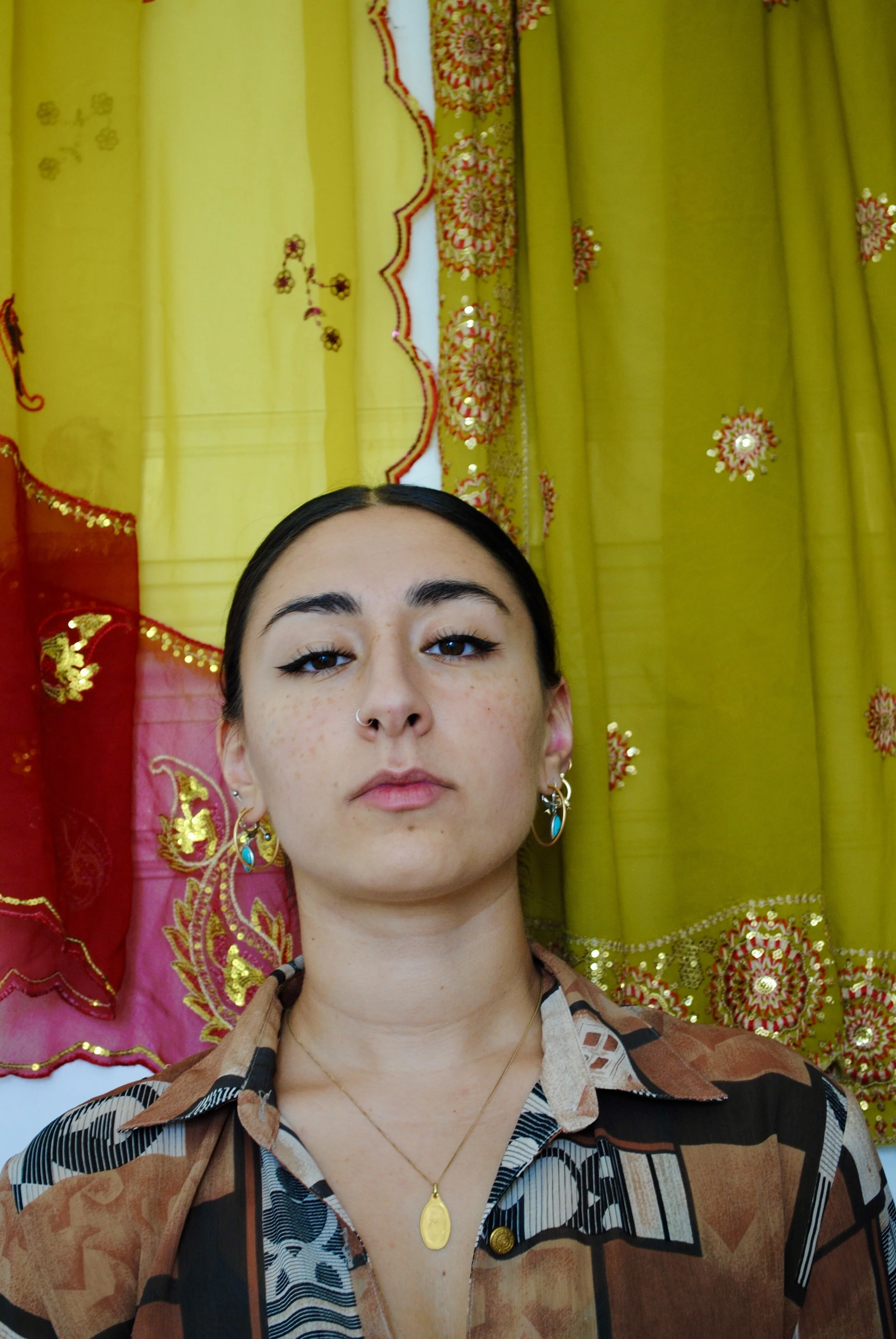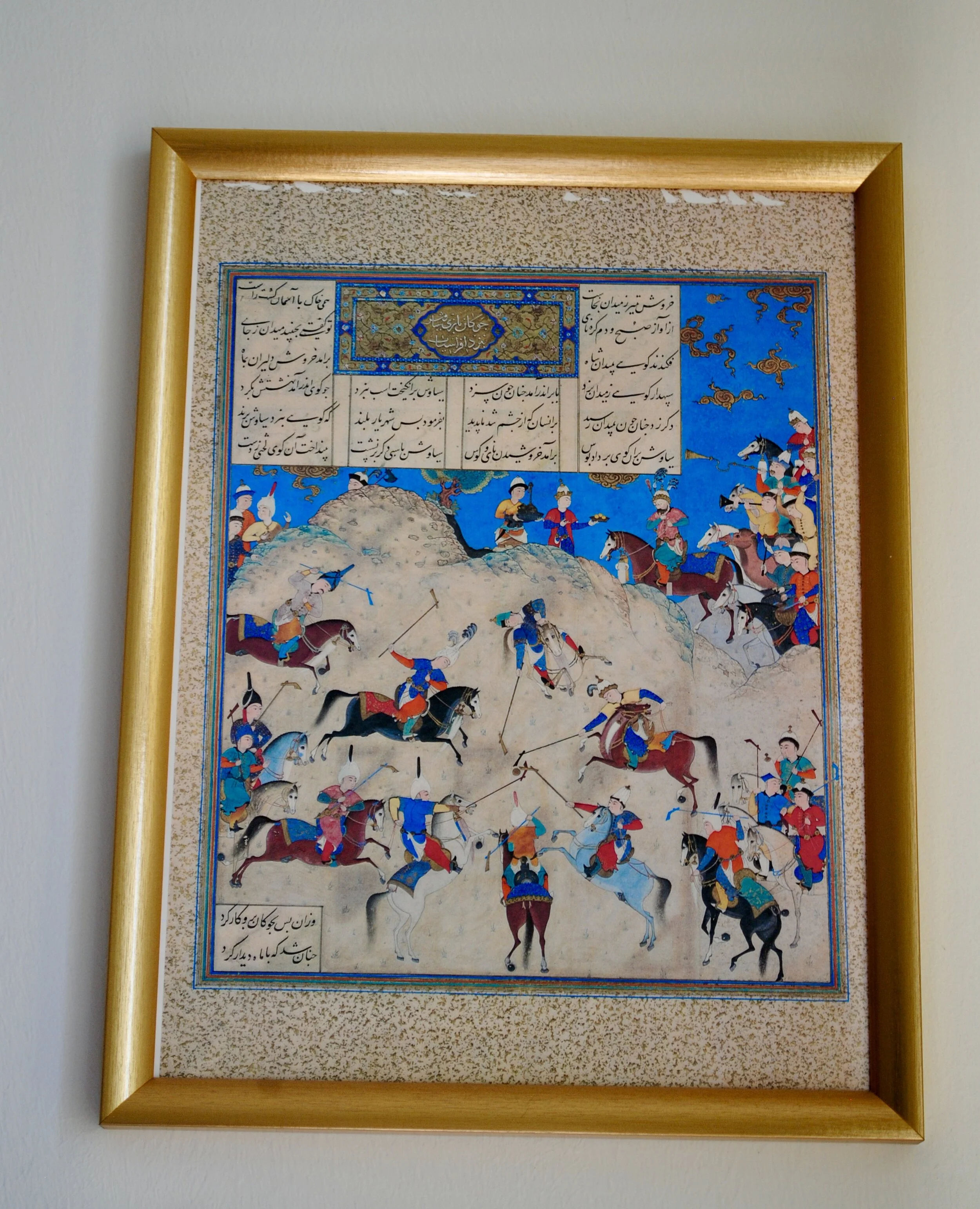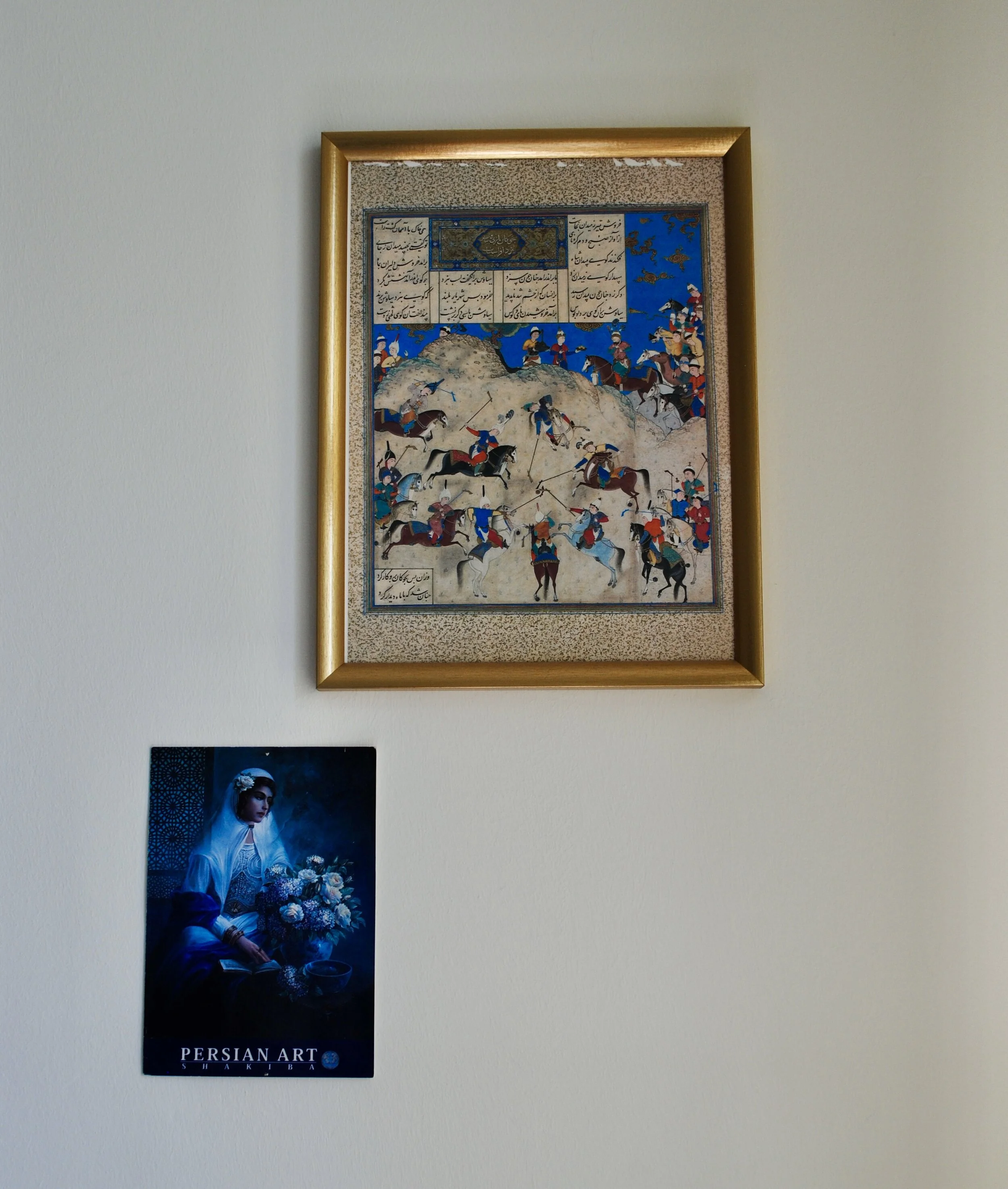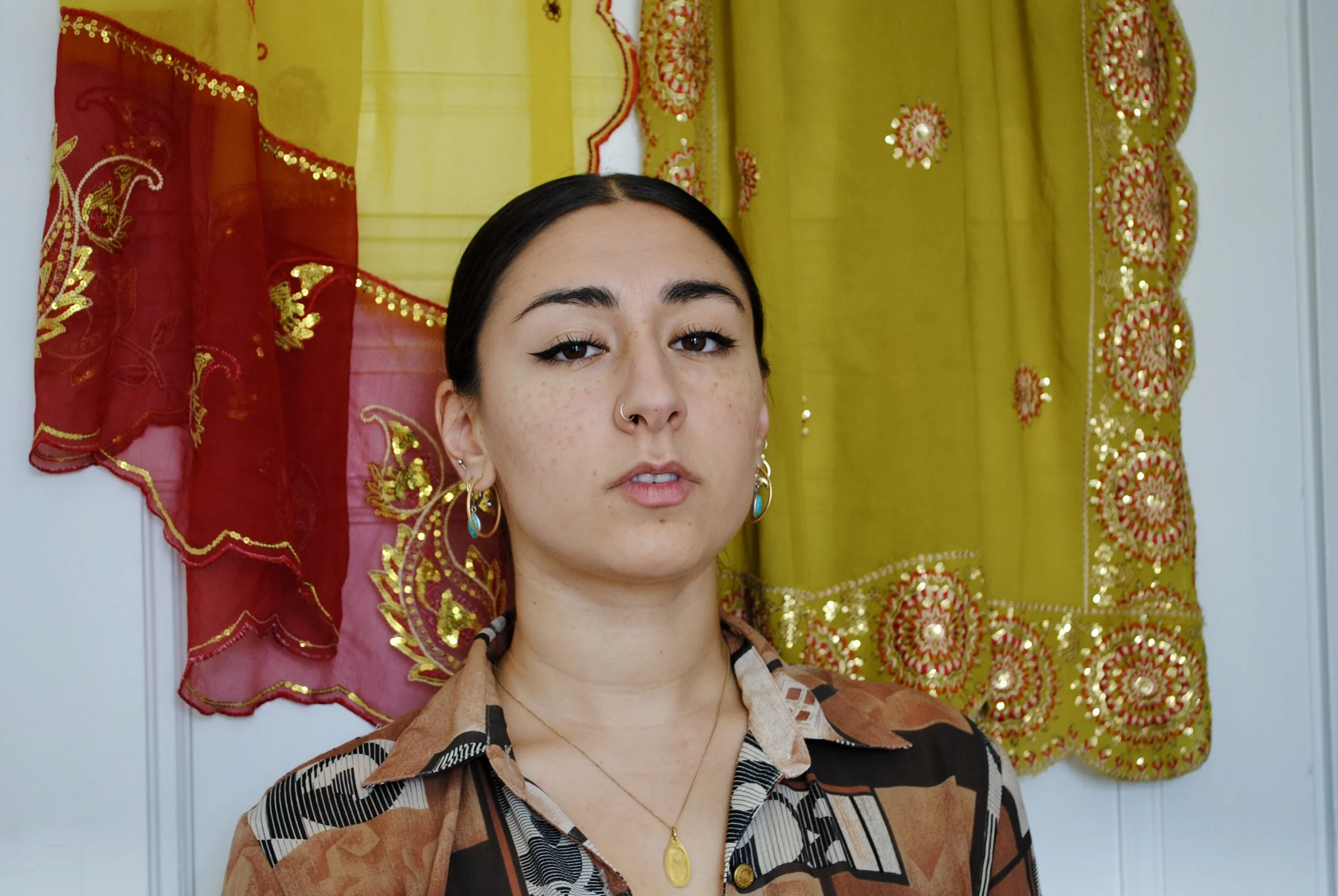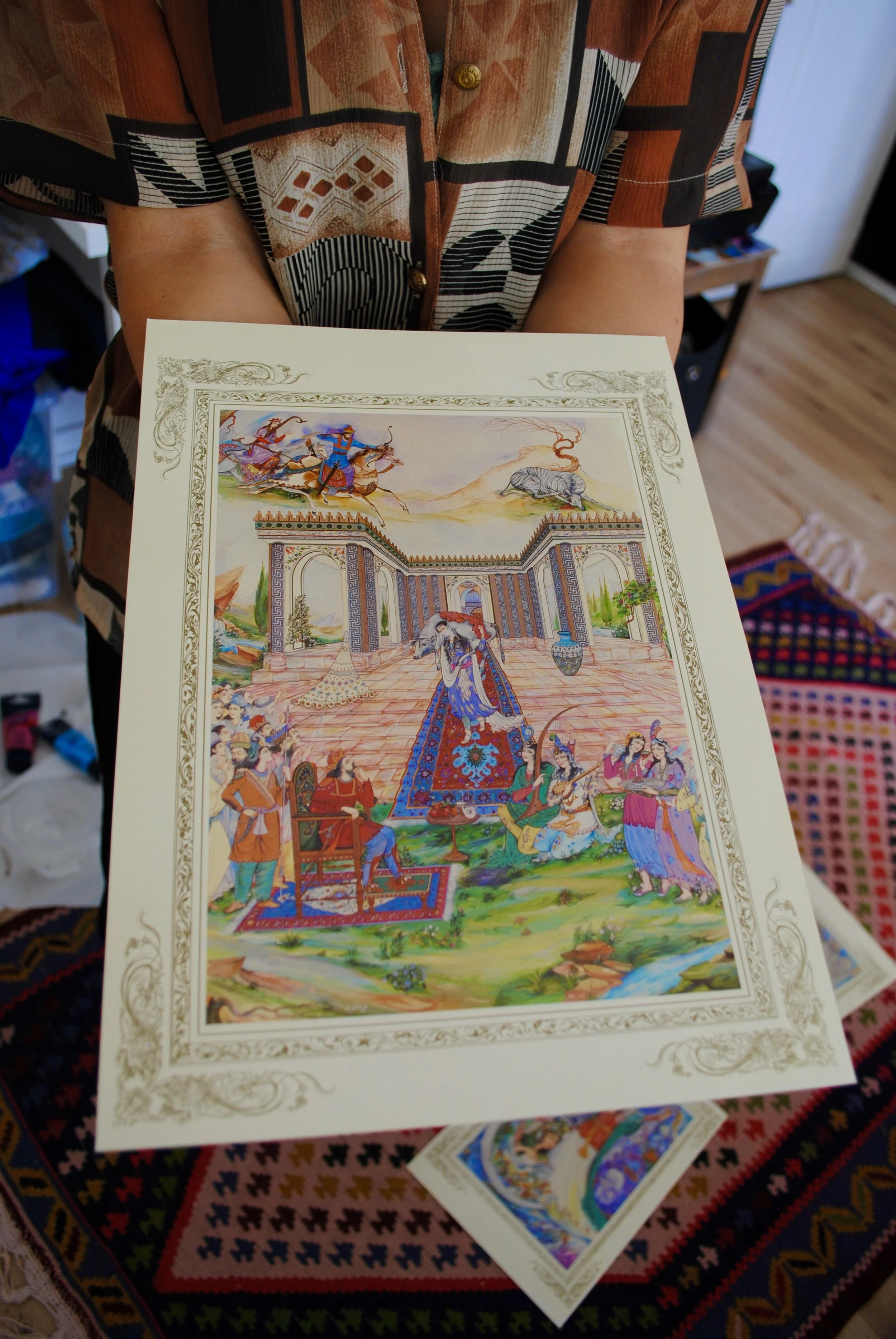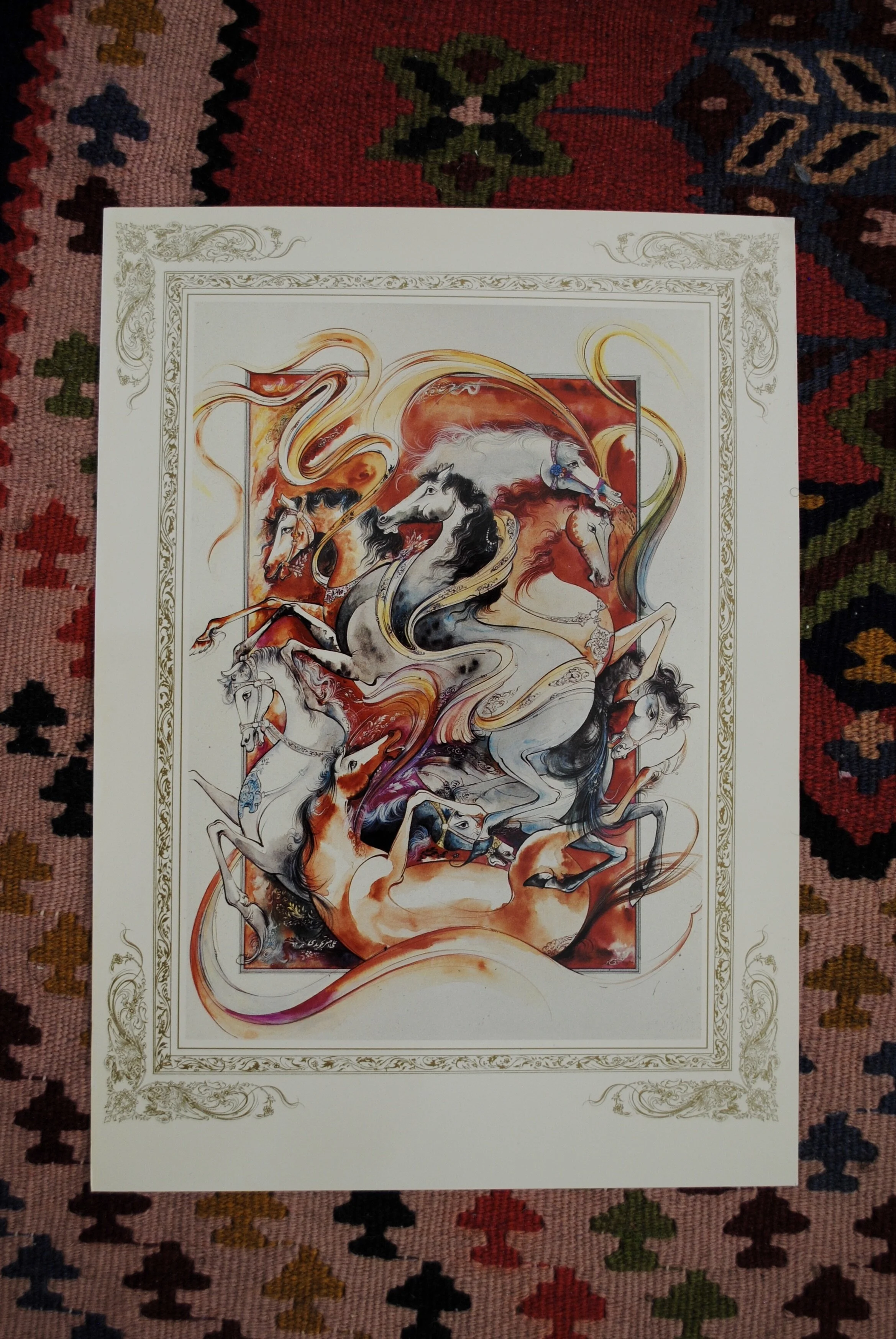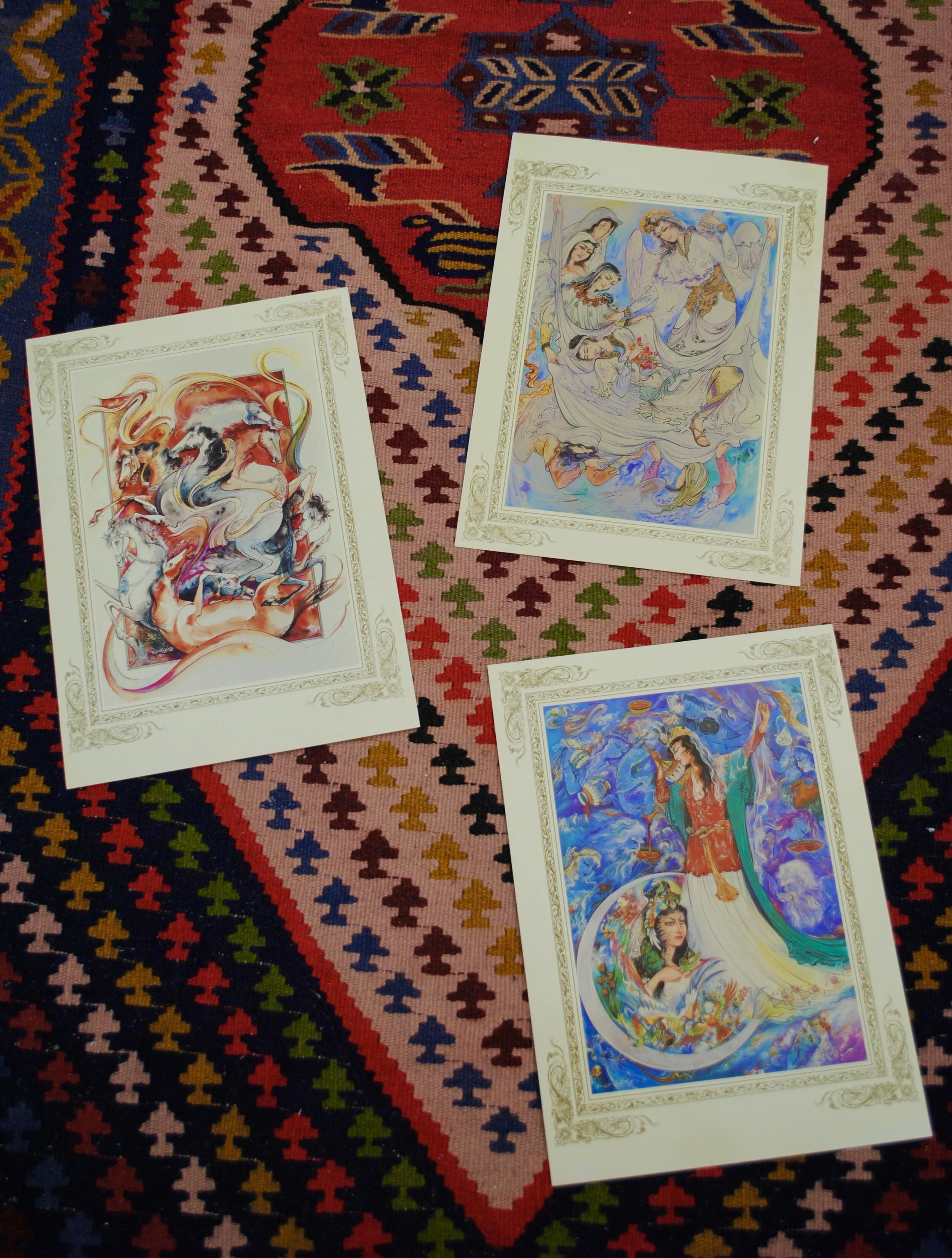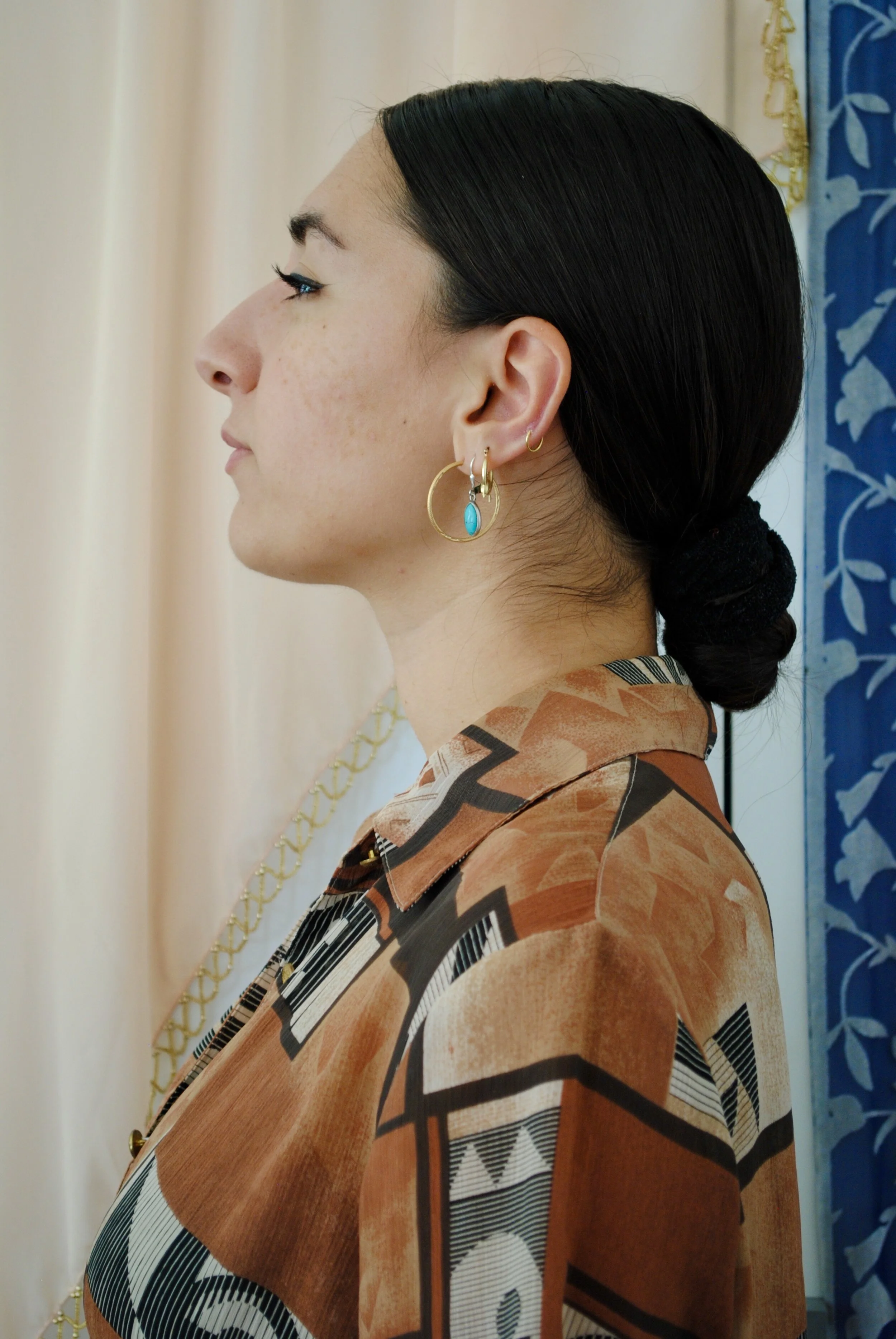On Movement, Germanness & the Model-Minority Trap: In Conversation with Canan Mona Pour-Norouz
Canan Mona is a 25-year old researcher and choreographer based in Berlin, Germany. She is a student of Political Science, and is currently writing her Master’s thesis, focusing on constitutionalism, judicial politics and minority rights. On an artistic level, she works as a professional dancer and an aspiring movement director. No Borders had the pleasure of visiting Canan on a sunny day in Berlin, this past July.
What is your ethnicity and where were you raised?
I am Azeri and Persian - my father’s ethnicity is Azeri, and my mother is a Persian woman, but their country of origin is Iran. I, however, was born and raised in south of Germany, on the border to Switzerland and France. Thus, I’m not a first generation immigrant. I don't have a story of migration myself, but my parents came to Germany from elsewhere.
What was that experience like, being the daughter of immigrants in a rather conservative part of Germany?
It was interesting to say the least definitely a constant struggle to find my own identity, even though back then I didn't have the language to describe what was going on in my head. I always felt a disconnect. I always felt that I didn't really belong to the majority of society that was present in this pretty conservative and rural area. At the same time, I didn't have that deep connection to Iran either. I've been there three times now, the last time was when I was 15. This was particularly difficult because I grew up around a lot of Turkish friends, who had a very deep connection to Turkey they would go there every year. They always told me: ‘I don't need the approval of Germans. I'm Turkish, and I'm proud of it’. I wished I had such a deep connection too, because at the time I didn’t. I felt like I needed to adapt to the same society that I had been born into. Yet, I experience a lot of othering from the German society as well, so that’s mainly where the struggle lies. My parents also struggled to understand their positions within German society. While my mother was focused on building a future here, my father reminded us that we would always be seen as different. And then there’s the ethnic and lingual differences between the two of them as well they don't speak the same language. My father speaks Azeri and my mother speaks Farsi. We would speak Farsi in the household, but my brother and I would speak German to each other, and we would also speak Turkish because we picked that up along the years. Certain topics would just be discussed in Turkish, for some reason. I learned Turkish kind of on the street, because I was listening to my Turkish friends a lot. I used whatever language I could, to best express myself.
Can you elaborate on the ways in which you were made to feel othered?
For the longest time, I was in denial. I was a kid, and I really just wanted to prove to everyone that I was cool. I wanted to be loved and accepted by everyone - unconsciously trying to mask my foreignness. I had enough people that I could hang out with - I was quite the entertainer. However, I was pretty lonely. I would come home from school, and I wouldn't see anyone. They’d have sleepovers, which weren’t really accessible to me because my parents just didn’t understand these kinds of things. They’d say: ‘What do you mean sleepover? You have a house!’ So, as a child, it would be those little things that would make me feel othered. I think my foreignness became more and more clear to me, when I realized that it wasn't only positive things through which I was made to feel different, but also negative things. For the longest time, it was ‘positive’ racism, right? They’d say: ‘wow, what is this jewelry you’re wearing? That's so exotic’. I was faced with a lot of cultural appropriation, but keep in mind that back then, I didn't know any of these words. I would just feel that something is wrong, and eventually convince myself that I was being overly sensitive.
I always had really long hair, all the way down to my butt. And my mom really took care of it. It was a very, almost spiritual thing for us. Every morning, I would wake up and she would brush my hair, say her prayers and wish me the best for the day to come. That process became a very sacred thing to me. But kids would always be all up in my hair. And one day, someone told me, "your hair is so beautiful and so long. I wish it was blonde, then it would be perfect”. Back then I couldn’t quite figure out what was wrong about that, but as I got older, I realized: you want the ethnic exotic features, but you want them on a white person. For me, that’s the definition of cultural appropriation.
I always felt I had to prove myself. I was always very good in school. I was the good immigrant. And sometimes, I benefited from that, because people said to me: “you’re not like the other immigrants, like the Turkish ones, Persian people are so smart. All of them are academics". Ranking migrants in such a way is obviously the core of the ‘model minority’ problem. At the same time, whenever there would be conversations about any countries in the so-called Middle East, I would become the representative for an entire region. And if I didn't say what they wanted to hear, I’d be accused of being a radical Muslim. The hardest part about being made the spokesperson for a huge group of people, was that I wasn’t even sure I knew enough about my own Iranian identity to speak to that, let alone speak for an entire region. Once I got older and started reading literature on these kinds of experiences, I was finally able to find the words to describe my own.
Were you surrounded by other immigrant kids?
I was an outsider at school because I was at a gymnasium, which is the ‘highest’ level of schooling in Germany. One thing that I quickly became aware of, is that seeing almost no immigrants at a gymnasium is not just a coincidence, it’s a structural issue. There is a reason that many immigrant kids are at the hauptschule. I was lucky enough to have wonderful teachers who thankfully loved and supported me when I was in elementary school, so they made sure I went to the gymnasium. My brother wasn't that lucky - he was very smart but they didn’t believe he could make it into the gymnasium, so they sent him to the realschule (secondary school). I was the only immigrant kid in 80% of my classes. Outside of school, there were many Turkish kids that I spent time with. However, my brother and I were the only non-Turkish ones in that whole group, and I'm not going to sit here and accuse the Turkish minority of excluding another minority. I know that's not how these processes work. But, it was difficult for us to handle because when him and I would speak in Farsi, they made us feel different as well. Some of them would accuse us of praying the wrong way because we're Shia and there are Sunni, so it was a lot of these little altercations. But overall, I’m so thankful to have had that Turkish influence growing up, because we had similar diasporic experiences. The lifestyle is very similar, especially when you're all from the work- ing class, but it's never fully identical. That has to be taken into account. But overall, we definitely grew up pretty isolated.
Were there no other Iranian families around you?
There was one Iranian family in a city that was about half an hour away from us. And we were friends with them. It was good to hear people outside of my immediate family speak Farsi. People underestimate how important that is - to hear and feel your language being spoken. But really, it was just my family. That was my Iranian diaspora. Just the four of us.
What about since you’ve moved to Berlin?
I certainly have met a lot more Iranians here, and I was just ecstatic about it at first. But then, the more people I spoke to, the more I found out that it’s not necessarily a homogenous, close-knit group. It's just everyone doing their thing. Some people are connected. Some people don't really care about other Iranian people living in Berlin, which is also understandable - the pressure of having to connect with people from a similar background as you, isn’t nice either. I definitely met a couple of people here and there, which I'm very thankful for. It was nice to exchange with them. But I wouldn't refer to it as a close community. At least that's not my experience.
What do you do right now?
I am a student of political science and I'm about to write my master's thesis. I do a lot of research on constitutionalism and policy analysis. I’m very passionate about legal and political equality when it comes to lawmaking and legislation. My focus during the last year has been on the intersection between international environmental law and human rights, and conversations around the global south. On the other hand, there’s my artistic side. I'm also a dancer, a choreographer, and an aspiring movement director. When I say aspiring, I mean I’ve gained experience in those fields already, but I hold them to such a high caliber, that I always want to make sure to point out that I'm still learning.
Tell me about your process of becoming a dancer. What drove you towards that kind of art practice?
I started when was 17, which is pretty late for dancer. Most people, especially studio kids, start at the age of three with ballet - they‘re kind of born and raised into that space. With me, however, it came pretty late. I joined this commercial hip-hop competition crew for about a year, and then realized that wasn't what I needed or wanted. The competitive nature of it all can be a good thing, because it really pushes you to train hard. However, I felt a huge disconnect to what I was doing. It was pretty much a puzzle of different influences, which isn't necessarily a bad thing, as long as you teach the foundations of the styles that you are incorporating in your sets. And very often, based on my personal experience in competition crews in Germany, they neglect that. When I moved to Berlin, I decided to reset and really dig into the art forms of dance, figure out what the different styles are, what the histories of those styles are and how to best represent these differing styles. What's the whole culture behind it? I definitely have my foundation in hip hop. That's where I feel most at home. But I tried to become as versatile as I could possibly be, while still focusing on the things that I loved most. I've also had the opportunity to experience the actual dance industry, and what it means to really show professionalism and be on stage. I have immense respect for all kinds of dances, but my love definitely lies in the creative part of it, the whole visual part as well. I enjoy creating a piece of choreography that tells a story and really visualizes music. And then, the whole freestyle scene and battle culture - those forms of exchange really fascinate me.
Have you been able to find / build / foster community within the dance world?
I was lucky enough to join a crew called Kingsmen, Berlin. It was founded by London Dyer, who is a dancer and choreographer from London, UK. For years, we would lock ourselves up in a studio and just train, try to become really good at what we were doing in all areas. We came from many different styles and we tried to bring that all together. I think that dance is not really possible without community. I was very lucky to be able to dance in different locations. Even apart from all the international communities I’ve thankfully been a part of, like in London and Toronto, I also personally try to incorporate the whole aspect of community and togetherness into the pieces that I create. In 2018, The Company Berlin, which is an agency and platform, they created a choreographers ball, which gave both aspiring and established choreographers the chance to present their art. I was lucky enough to be a part of that lineup - it was the first big piece that I choreographed and was able to put on stage. I chose the song ‘Desert Rose’ by Lolo Zouaï , who is a French and originally Algerian artist. Her own multicultural identity really comes through in her music - the whole song is about feeling disconnected to your Algerian upbringing and culture within France. And so, I created a whole storyline of a harem in the traditional sense, not the westernized, sexualized idea of a place for naked women, but, the idea of a huge kind of collective community that lives in the same place. I depicted the story of me, finding my own femininity, and the heartbreaks that I endured because I didn't feel seen or understood either by specific people or by society at large. I chose to depict this storyline with four dancers who I see as my sisters and who all come from different styles. Each one of them embodied a different character, and ultimately, it was about finding my way back to myself. For me, these women represented the whole aspect of sisterhood - we don’t only train together, but we grow together. The styles of dance that we do represent the battles that we have in our minds. Dance has this therapeutic aspect to it, it’s so much more than just moving your body, it’s a deeper connection that we feel towards and between each other. For me, it’s very important when I create a piece of movement, that I include the people that have shaped me.
Dance has been the best teacher when it comes to exploring the depths of self expression. It has opened my eyes to things I didn't know were possible. At the core of it, I'm a writer I’ve always written poetry, which is also due to my parents and the influence of Persian culture. Iranians have this thing of randomly, throughout the day, quoting Hafiz, Rumi and all the other great poets that we have. And my parents would do that, so it very quickly became my way of understanding things. Everything was always super emotional for me, and writing poetry allowed me to be extremely emotional without feeling like I was being overly dramatic. So, dance as a kind of narration and storytelling practice, relates to the writer in me, as well. What I learned, is that when you dance, if you really want to use it as a method of self-expression, you have to look at the context in which you’re moving. Let's say you take part in a house session you’re immersed in house culture, that's the whole history that you're representing in that moment. Or even if you're in a class, and you're learning a piece of choreography - you have a class etiquette, you’re still representing a certain part of the community. And I think that's what gives it so much meaning. The ability to speak with your body has taught me that you don’t always need to be verbal about things. You can also visualize them and people will still get the message.
How did your history and identity influence your choice to study politics?
I have my mother to thank for that. She would always make sure to remind my brother and I that we need to work 10 times harder than everybody else if we want to be accepted. I'm thankful that she didn't beat around the bush. She’d say, “listen, they will always label you as a foreigner, so this is what you have to do if you want to make something out of yourself”. That was a big source of inspiration for me. Studying politics kind of came as a result of not really understanding what the heck was going on in the world. My father would always spark political discussion at the dinner table - he’s a very emotional person. He gets very, very angry at injustice. And I always thought: there must be a way to do something against it. I quickly figured, if you want to find a way, you have to understand it first. This is what led me to study political science and sociology at the Humboldt University in Berlin. I do a lot of policy analysis. And in the past, I have definitely analyzed policies within Germany. I wrote my bachelor's thesis about a policy that was created to prevent radicalization - not only focusing on radical Islam, it was about the issue of extremism as a whole. In recent years, I've seen more and more people from the working class, from immigrant families, make it to university, but there's still a lot of work to be done there. I think at times, I would’ve appreciated just focusing on my studies for the love of it, and not always having this thought in the back of my mind: if you fall, you’re a failure. And that thought comes much more from myself, than it does from my family. That's why I always tried to be the good immigrant. I had internalized that many of us fail in this society. As a kid, I wasn't reflecting on the structural dynamics that even make that the case. I just saw many of us ‘failing’. And I didn’t want that, I wanted to ‘make it’. I wanted to go to university. I wanted to have a great future, also for my kids. And so, I had to be the good immigrant. I have to speak proper German. And be excellent at everything I do.
How does being Muslim tie into your identity? How was it practiced at home?
It was not really regularly practiced at home. However, I'm very thankful that my mother did make sure to introduce us to it. She prays, but she doesn't pray three times a day anymore. She just prays on her own time. The core faith always remained. My mom allowed me the freedom to explore and to fully understand what I stood for and what I didn’t stand for. My brother and I, when we were kids, we went to a local Muslim Association in the small town that we were raised. It was mostly Quran teaching lessons in our local mosque. Basically, we would memorize parts of the Quran. I learned how to read and write Arabic there. And then I tried to apply that to Farsi because it’s the same alphabet, with a couple of differences. We didn't fully feel connected to that community, again, because of Shia and Sunni differences.
When terrorist attacks would happen, I sometimes ended up questioning my faith, because that peer pressure was just so strong. It doesn't even matter how confident you are in what you believe in, or how grounded you are in your religion/culture. If everyone around you paints this picture of your people as the bad guys, you start to believe it, you internalize it. And so, I initially thought: I have to be the good Muslim, I have to be the one that's moderate. I have to never be radical and understand all religions. But as time moved on, I realized the problematic nature of generalizations and of forcing individuals to represent an entire group of people.
Growing up Muslim in the Western world is not a joke. And I can’t even fully speak for that experience, because I don't wear the hijab. I can pass as non-Muslim, if I want. Visibility is key in this discussion. I definitely don't have that label of being Muslim written all over me. In Germany, I kind of do because they have this idea of all kanaken being Muslim. It took me a while to realize that it’s not okay for a white person to say the K word. It’s a term we are actually currently reclaiming, which has also been debated a lot in the greater discourse, mainly between academics who talk about how that word itself has been appropriated.
Can you give some background information on the term ‘kanake’ and how it functions in the German context?
Personally, I’m glad that the word exists, if I am being honest, because even though I am aware of the whole controversial nature of it, it definitely gives me something to hold onto. I can see that kanaken in Germany have a very similar lived reality. Maybe it’s because I never had a huge Iranian diaspora to associate myself with, so this is the larger group of people that are socially read the same as me, and we’re collectively othered similarly by society as a whole. We can find our identity within and amongst each other. I believe that it’s legitimate to reclaim the word because it has been imposed on us as a derogatory term by the majority of society, and it has definitely been used to discredit all the work that immigrants have done. Many people are not even aware of the fact that the Gastarbeiter the people that came here to help built this country - how much these people were exploited and how hard it was for them. This term was used to to dehumanize them. So, for us to now reclaim it, to say that language is powerful and I am going to refer myself as that but you cannot do the same, is a very empowering act. However, I also understand people that are not cool with it – many don’t appreciate this act of labeling. It’s a conversation that needs to happen within our community. I think it’s not the place of white people to tell us if we can call ourselves kanaken or not.
What does the word itself mean? Where does it come from?
The word itself comes from the indigenous population of Kanaky, what is now referred to as newcaledonia. Back then, the Germans appropriated that term, taking it from them and using it against a different group. That’s why we’re now the ones are reclaiming it. There has been a debate about whether or not we are appropriating the term, as it actually refers to a different group of people. And I understand that, I’ve also questioned whether we should be using and/or reclaiming it, but historically we weren’t the ones that stole it initially and the term has been used in a derogative way against us, so now we are taking it back. It’s something that has helped me find an identity and feel empowered.
In what ways do you stay connected to your Iranian heritage?
Mostly through culture and art. I constantly try to balance how much of it really shapes my life and how much of it doesn’t. I am always willing to represent my Iranian heritage and give thanks to the rich history and culture that I come from. But at the same time, I don’t want to over romanticize it and act like it’s not a difficult thing to live in the diaspora, or to not really feel connected to ‘the motherland’ in the way that people from other countries do. All the PTSD that runs through my family line - of having the experience of being forced to leave their home. None of that is fun, and I cannot and will not romanticize that. That’s why I always make sure to show people that I can appreciate and love the people of my country, its history, all the solidarity and the art and culture that dates back to 2000 years ago. But I do this without ascribing to the nation state, because I am generally very critical of nationalism and nation states as the ultimate representations of who you are and what you stand for. I definitely think it’s possible to allow your heritage to guide you through life, to show you how you understand things, and why you understand things in a certain way, without having to fully ascribe to the tradition or rules of that society. But I don’t know how everyday life is for those living in Iran, and so I would never sit here and claim that I am fully guided by being Iranian.
What I am really thankful for is the languages and the art. I love listening to Persian music, be it classical or modern music. I always appreciate seeing the developments there. I adore artists that blend more traditional Iranian sources with their own modern sound. Someone that comes to mind is Sevdaliza - when she came up, I felt ultimately represented. She was even born in Iran, and she really puts us on the map. When I label my projects, I always give them a Persian name and she has done that with her most recent album. It’s a really nice way to see yourself represented. I went to her concert and she sang a song in Farsi . I have never cried that much in public. It showed me that representation does matter it’s a difficult topic these days, because it's very often used for capitalistic gains. However, at the core level, I think it does matter because in that moment, I was watching someone who I feel oneness with on that stage, and I could visualize myself entering spaces that otherwise would have been too foreign or intimidating to me.
Can you speak to the differences in being a person of color in Germany versus in other places, like Toronto for example? In what ways does context play a role?
I realize how privileged I am because people read me differently in different contexts. I am racially ambiguous in some places. In Toronto, there’s a huge Iranian community. Iranians actually refer to it as ‘Tehranto’, especially in the greater Toronto area, where my aunt lives. I actually met her for the first time in my life when I was there. Walking through the streets, I saw so many Iranian shops. I’ve never had that type of experience before. But yeah context really matters when it comes to how people perceive you. When the BLM protests really started, I wasn’t in Canada anymore, but I saw my friends in Toronto standing in solidarity with the Black community, without centering themselves, even though so many of them are POC. So many of them experience racism, especially in Canada indigenous people are still waiting for reconciliation, constitutional amendments, reparations and so much more. But most people made clear that this particular fight is about the Black community.
In Germany, I saw a lot of white people centering themselves. I saw a lot of performative activism going on. I think POC, if we can even speak of them as a homogenous group, were struggling to admit that we have a lot of work to do ourselves when it comes to anti-Blackness. They would be really proud to be an ally, and show solidarity, but when the conversation would go in the direction of how much anti-Black- ness there is within our own communities, the conversation slowed down a bit. Also when it comes to colorism I benefit from colorism generally, but not in the Iranian context. Very often I have been labeled ‘the dark one’, especially by my father’s Azeri side of the family. Colorism is a huge issue within our communities too, and that was taught to us through colonization, neocolonization and the whole concept of white supremacy. We have a lot of unlearning to do, and I saw in Germany, that many people were struggling to admit that we have a long way to go. We need to reflect on our own racist mindsets and not forget is that this is a fight that needs to be fought collectively. I saw so many POC showing solidarity and in the same breath, questioning whether they would receive the same solidarity, especially when it comes to police brutality. I understand that fear because if you look at police brutality, racial profiling or the ‘NSU-Komplex' in Germany, very specific groups are targeted. There are a number of groups that simply aren’t protected by the state in many scenarios. But when we are talking about social movements it’s important not to think of it as a give and take, but to think of it as a collective effort. In Germany, BLM showed that the discourse needs to be worked on severely, because this country has a huge problem with remembrance culture. I was 18 when I found out about Germany’s colonial history. Germany has yet to acknowledge the horrors of its colonial past. You cannot act like you don’t have the capacities to educate people on everything. You absolutely can, and I don’t understand the idea of ‘not having the time’ to also educate kids in school about our own history of colonialism.
Do you identify as German?
It is certainly a part of my identity, yes. It breaks my heart that whenever I try to speak on certain issues within this country, Germans often say: “well, if you don’t like it here then why don’t you go back to where you came from?” My first thought is always: where would I go back to? And also, why am I begging you to understand that I am German? I don’t want to give you the privilege of deciding my identity for me. So, honestly, I go back and forth. It gets tiring trying to better this country, trying to advocate for policy change or a shift in the discourse, to have to constantly prove my Germanness. Sometimes I don’t feel German at all, and other times I’m reminded of all the lovely German friends I have. They never question my identity as a German person, so why I am focusing on the structures that push me to the margins? Isn’t community more important? Isn’t your local bubble more important? Isn’t that really your home? At the end of the day, I was socialized in Germany. I would be lying if I say it didn’t have an effect on me, and it had many positive effects on me as well.
